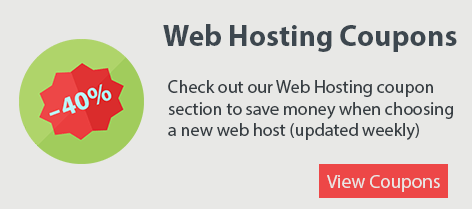Here’s a few of the most common beginner website hosting mistakes you can make.

Not Reading The Terms of Service
When you first sign up for your web hosting service, it is important to review the Terms of Service agreement, Usage Policy, and any other documents. Many new hosting customers make the mistake of not doing this, and then they’re surprised by hidden fees, issues with their scripts, or limits they weren’t aware of. If any of the following points are not covered in the TOS or usage policy, you should contact the web host directly to find out.
Some of the information you should look for is:
- Limits to number of concurrent connections to the server
- Limits on video or audio file hosting (even if it’s unlimited for web hosting files)
- Concurrent connections, entry processes and CPU usage
- MySQL database limits
- Billing cycle & how much notice before cancelling
- Additional costs and hidden fees
Choosing A Host Solely Based On Price (going for the cheapest)
After browsing many of the top review websites, you’ll notice the cheapest web host is not always the best! Make you research the specific plan you’re interested in, instead of just going for the cheapest. Many web hosting providers also offer multiple tiers of service, so if you’re choosing the cheapest, you may be stuck with very low server resource limits.
While we’re talking about price, now is a good time to mention FREE web hosting providers. Most often, free hosting plans offer poor support, and litter your website with advertisements. In some cases, you may notice you’ll be charged hidden fees for upgrades, or the ability to use your hosting account to it’s full potential.
Not Comparing Options
One of the worst things you can do is choose the first web host you come across: the one that advertises the most, or pays for promotions instead of real reviews. When conducting research on web hosting providers, it’s very important to consider multiple that match your criteria, chat with all of them, and then make your decision based on the level of support received, and discounts or promotions available.
It’s always good to trust on your judgment and first impression than going by any advertisement or biased opinions.
Forgetting About Backups!
New web hosting customers are often so excited to get their website up and running that they forget one of the most important rules of content creation: back up your work! Imagine losing hours, or even days worth of work because you skipped this very important step. You could install a compromised plugin without knowing it, be affected by malware, or simply accidentally delete your entire website(It’s happened!). You must have a solid backup plan in place!
Many providers offer a premium backup service, or even include daily backups in their hosting plan. Make sure you can go back at least 3 or 4 days in time, in case you don’t catch the issue right away.
Downloading Themes and Plugins From Untrusted Sources
Have you ever seen premium (paid) WordPress plugins available for free? Or maybe for some other common CMS? You must avoid “Free” premium plugins or any sources offering paid plugins for free to the mass market. Not only are these plugins outdated and not supported by the developer, but they’re almost always patched with malicious scripts that either steal your data and sensitive website information, or distribute spam from your server as soon as they’re installed. If that’s not bad enough, many of these plugins give the distributor backdoor access to your website.
Always download plugins and themes from reputable sources, and check the reviews & compatibility ratings.
Not Using Permalinks (Blogging & WordPress)
The default permalink structure for WordPress is /?p= with a number at the end. This displays URLs such as http://website.com/?p=4834 rather than the ideal URL such as http://website.com/title-of-page.
This is most common on WordPress websites. Every WordPress instance has a Permalinks option located under Settings.
Your URLs need to contain relevant words (such as the title of the page or blog post) for better Search Engine Optimization, social sharing, and so your page structure is more sensible to website visitors. You can check out the official Permalink Usage Guide by WordPress.
Not Choosing The Right Level Of Service and Support
There are 4 main types of web hosting: shared hosting, cloud hosting, VPS (virtual private servers), and dedicated servers. Depending on your server resource usage, storage space, and other requirements, you need to consider which option best suits your needs.
If you’re starting out with a small blog or business website, shared hosting may be perfect, but after adding e-commerce, video hosting, and gaining thousands of visitors per month, you should consider upgrading.
At the same time, consider the level of support that comes with the service. If it’s a server, is it “fully managed”? For shared hosting, does it include 24×7 technical support? Will they assist with installing scripts, do they support third-party software?, etc.
Neglecting SEO and Analytics
There’s a few different sides to SEO, and many people forget to do any optimization at all. “On-page” SEO can be very important, but luckily there’s so many plugins to make it easy. The basics of this are optimizing your title tags, page descriptions, keywords, and simple things like updating your sitemap, and ensuring you don’t have duplicate or copied content.
Your website must be utilizing both on and off page SEO techniques to maximize your chances of getting ranked in search engines. Check with your hosting provider to see if they offer an SEO addon.
Understanding The Work Involved
If you’re the do-it-yourself type, you may choose to build a website yourself and luckily, many web hosting providers offer all the tools you need to get started. Check to make sure there is a “script installer” (such as Softaculous) and an easy-to-use control panel.
If you’re not comfortable learning new software or utilizing the Site Builder, consider hiring a web designer or someone to help you. Just because your hosting provider offers the tools and an easy Site Builder does not mean you will avoid the learning curve of building a website, nor have the expertise on inbound marketing.
With an exciting journey ahead, we hope these few tips have been helpful.





